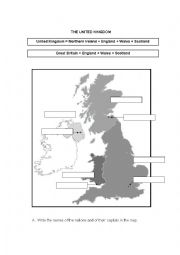
|
UK - map of nations and capital cities
This worksheet helps kids realise the difference between Great Britain and UK and also helps them to become aware of the different nations that these are made of. It is a painting activity, so it is good for a period when kids need relaxing in class or to consolidate at home what they�ve studied in class.
It is a bit kinaesthetic and works very we...
Level: elementary
Age: 5-14
Type: worksheet
Downloads: 49
|
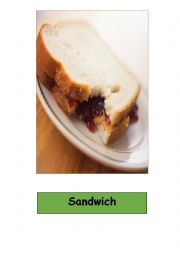
|
Food Domino C
This is the third part out of six.
If you are curious about this, look for the files Food Domino A and Food Domino B - I explain there how these pictures are to be turned into a food domino and how they are to be used.
I will upload the remainig files (Food Domino D, Food Domino E and Food Domino F) later on today and tomorrow (because of the lim...
Level: elementary
Age: 6-14
Type: others
Downloads: 5
|
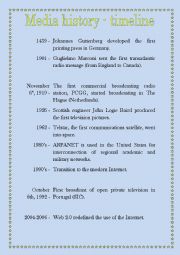
|
Media history timeline
This media history timeline should help make ss aware that the evolution of the media has been going on for a very long time, and has played a central role in the way we perceive the world.
Projecting one event at a time enables the teacher to elicit discussion from ss regarding not only the changes that event caused, but also its the relevance fo...
Level: intermediate
Age: 15-100
Type: others
Downloads: 16
|
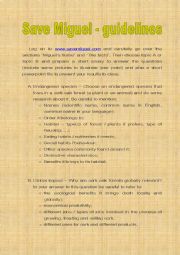
|
Save Miguel - Guidelines
Save Miguel (www.savemiguel.com) is a campaign (by an environmentalist organization and by a cork industry) meant to promote the usage of cork (instead of plastic - cork is not only natural and recyclable, but it also promotes a very large absortion of CO2) and to protect cork oak forests, which are a natural habitat for many endangered species.
T...
Level: elementary
Age: 13-17
Type: worksheet
Downloads: 9
|
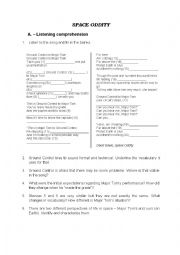
|
Space Oddity
This worksheet begins with an exercise to fill in the blanks of David Bowie�s song. It then moves on to some comprehension exercises on the contents that help ss better understand the two perspectives on space exploration (how Ground Control sees it and how Major Tom truly feels it).
Once the song is clearly understood, it�s time for critical read...
Level: intermediate
Age: 14-17
Type: others
Downloads: 19
|
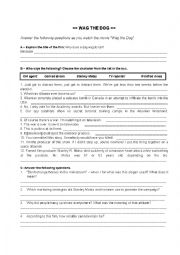
|
Wag the dog
This is a "while wachting" worksheet which helps students reflect on the ethics of the media - it focuses not only on the role that politics plays / may play in manipulating the media, but also on how much one should rely on information that is not checked by the usage of different means.
Level: intermediate
Age: 14-17
Type: worksheet
Downloads: 5
|
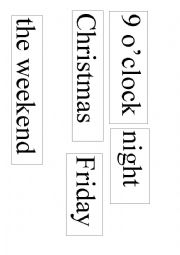
|
Prepositions of time and phrases to go with them
The boxes with time expressions are to be cut and distributed by ss. They should then come to the board, one at a time, and stick the card(s) they have under the adequate preposition (which had been previously cut and stuck there, causing three columns to appear). An alternative, for someone working with few ss, may be to give out to each pupil a c...
Level: elementary
Age: 10-17
Type: others
Downloads: 4
|
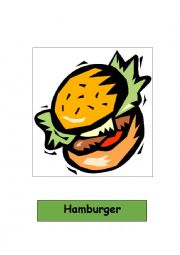
|
Food domino B
This is the second file out of six that are needed to complete the game "Food domino"
If you are curious about what this is or how it works, look for the file Food Domino A (I explained it all there) - there �s just one little thing I forgot: after having the pieces cut, I glued each one of them to a piece of cardboard and covered them in adhesive...
Level: elementary
Age: 6-14
Type: others
Downloads: 2
|
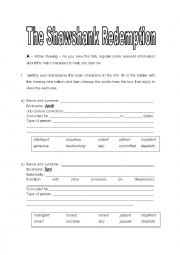
|
The Shawshank Redemption + present simple
This is a while-viewing and after-viewing worksheet on the movie "The Shawshank Redemption" for teenagers with a very low level of English.
Pupils are asked to register some personal data about the main characters and to describe the type of person the characters are as they view the film.
After the viewing, pupils are asked to use the present si...
Level: intermediate
Age: 12-17
Type: worksheet
Downloads: 8
|
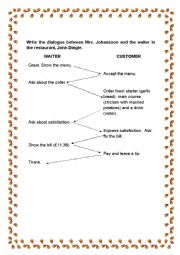
|
Writing exercise - at the restaurant
Ss are here asked to write the dialogue between Mrs. Johansson and the waiter in the restaurante, John Dingle.
Take-turning is very well defined here and ss are told exactly what to order, how much to pay, etc.
This dialogue was created to have ss apply the contents of a powerpoint I gave them in which the specific linguistic exponentes to be use...
Level: elementary
Age: 12-17
Type: worksheet
Downloads: 7
|
|
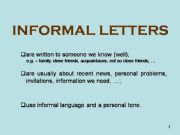
Informal letters
This powerpoint characterises informal letters. It clarifies who they are to be written to, the type of language they should contain and the tone to be used in them.
It contains practical examples of informal language (namely, of contractions, informal words, slang, colloquialisms), the structure t...
Level: intermediate
Age: 13-17
Downloads: 27
|

Reported speech
A powerpoint presentation showing the changes to be made from direct speech to reported speech - verb tenses, modal verbs, pronouns and adverbs (both time and place). The vocabulary used in examples focusses mainly on the topic "media", namely on Rageh Omar (the journalist).
Level: intermediate
Age: 15-100
Downloads: 37
|
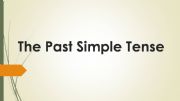
Past Simple Tense
Clear and detailed explanation on how to form the past simple tense (in the affirmative, in the negative and in the interrogative), and on spelling changes of regular verbs in the affirmative.
Level: intermediate
Age: 16-100
Downloads: 38
|

Defining and non-defining relative clauses
A powerpoint presentation on the basic differences between defining and non-defining relative clauses regarding meaning and form.
Level: intermediate
Age: 15-100
Downloads: 29
|

At the restaurant
In this powerpoint presentation I show pupils the different stages that are included in a situation in the restaurant (greeting, ordering food and/or drinks, asking for the bill, leaving a tip, ...) and I present them several specific examples of how they can actually perform in each situation (some...
Level: elementary
Age: 12-17
Downloads: 72
|
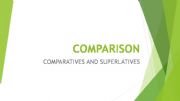
Comparison
What is the difference between comparative and superlative of adjectives? How are they formed, and what are they used for?
Level: elementary
Age: 12-100
Downloads: 22
|
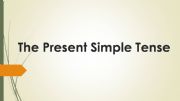
Present Simple tense
A detailed powerpoint explaining how the present simple tense is formed - in the affirmative, negative and interrogative forms.
It is a good tool for teenagers / adults.
Level: elementary
Age: 14-100
Downloads: 13
|
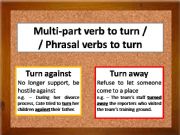
Phrasal verbs with turn
Powerpoint with phrasal verbs made from "turn" - the most common meanings are explained with a clear definition and a practical example of how each can be used.
Verbs with similar or opposite meanings are grouped in the same slide to help ss compare and contrast them as to meaning and usage.
Level: intermediate
Age: 15-100
Downloads: 15
|
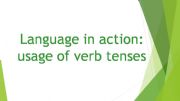
Language in use - verb tenses referring to the past
A practical example of how present and past tenses (both simple tenses and perfect tenses) differ in meaning and are to be used.
Level: advanced
Age: 16-100
Downloads: 17
|
|
|